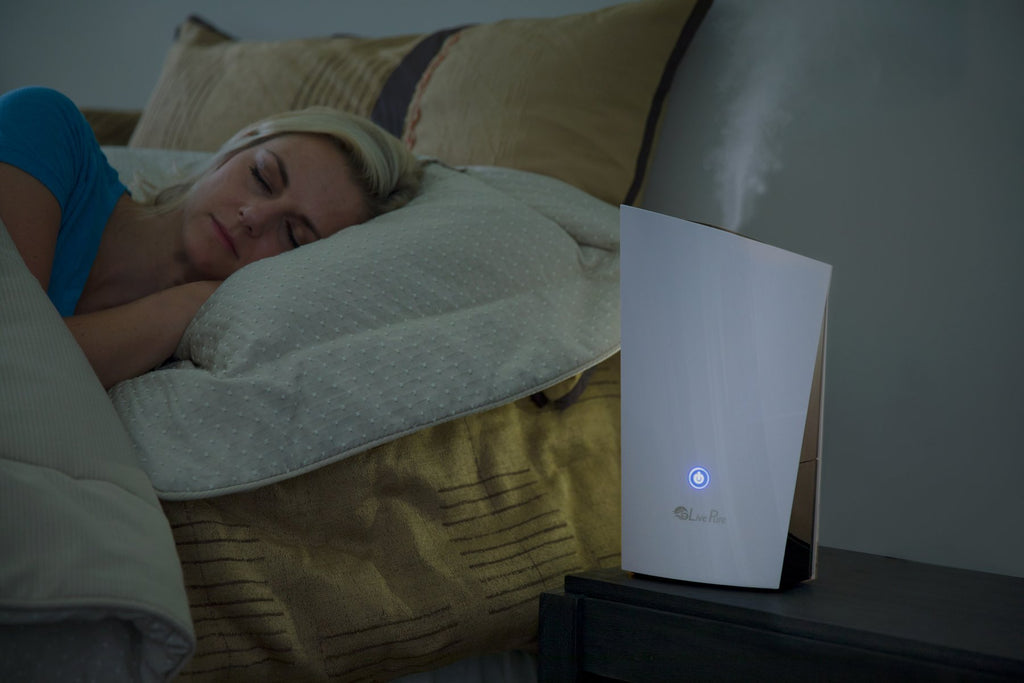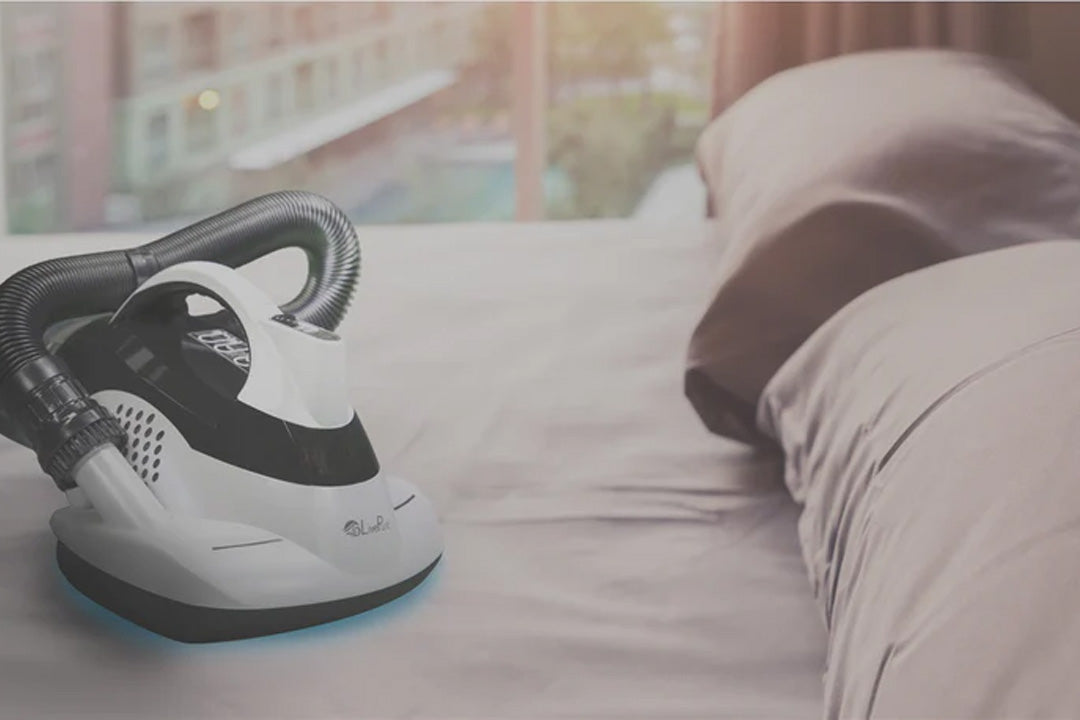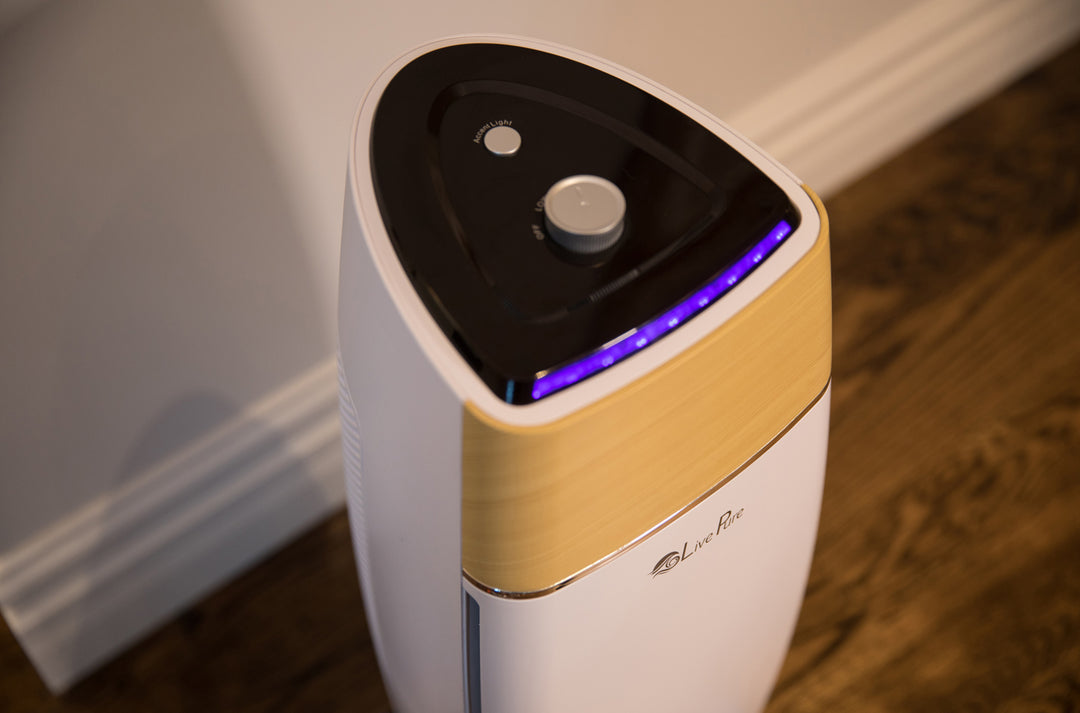5 Benefits of Sleeping with a Humidifier On

If you don’t already have a humidifier, you need one. Especially if you live in an area with cold winters. Heating your home during the winter results in dry air and low humidity. The low humidity absorbs moisture from everything in your home, including you.
This dry air can cause a variety of health issues including dry skin, brittle hair, dry nasal passages, sinus headaches, bloody noses and coughing. These symptoms make getting a good night’s rest pretty difficult. Humidifiers help combat these issues by adding moisture to the air, helping to improve the quality of sleep you’re getting. If you’re not convinced yet, here are five benefits to having a humidifier:
1. Makes it Feel Warmer
Running a humidifier while you sleep can help save you money. According to the American Gas Association, American households spend an average of $661 a year heating their homes. You can make your house feel warmer without cranking up the heat. The moisture the humidifier puts into the air makes it feel warmer. This allows many homeowners to lower the thermostat and conserve energy to save on that heating bill. The added humidity will also cut down on static electricity in the home.
2. May Prevent You From Getting Sick
Running a humidifier while you're sleeping can reduce your chance of getting sick. A study published in the research journal, Plos One, found that raising indoor humidity levels to at least 43% had a dramatic effect on about 85% of airborne viruses. The study showed that increasing the humidity level greatly reduced the chance of viruses spreading and the movement of the germs. These airborne germs combine with the moisture and become too heavy to float in the air. This is especially true for the common cold and influenza. A humidifier can also help you if you already are sick. Dry air can cause a person to have a dry cough, which can keep you up at night. Adding humidity to the air allows more moisture into your body, making your cough more productive, allowing you to sleep more peacefully.
3. Reduces Snoring
A humidifier can also help reduce snoring and sleep apnea. There are many causes for snoring, but it is often caused by dry air. When the air is dry, a person’s airways are also most likely dry, which can make snoring worse and irritate the throat. Using a humidifier will add moisture to the air and help relieve some symptoms. The added humidity will also cut down on allergens in your home’s air. Dry air often often has allergens, which can also irritate the throat and disturb sleep. If you wake up with a dry mouth, you most likely have low humidity in your home and should consider investing in a humidifier.
4. Keeps Skin & Hair Moist
Skin, lips and hair often become dry and brittle in the winter due to low humidity in the air. This can often cause your skin to itch which can keep you awake at night. According to Harvard Health, dry skin is much more common with age; at least 75% of people over age 64 have dry skin. Researchers believe this is because the skin loses its ability to retain moisture over time. Adding a humidifier to your home can help keep your skin and hair healthy.
5. Helps Your Home
Dry air can also cause damage to your home. Wood needs a constant level of moisture to be at its best. Over time low humidity will dry out wood furniture, making it crack. It can also loosen joints in a wood floor. Using a humidifier can help bring life back into your wood furniture, making it last longer. It can also make houseplants become more vibrant. Humidity also helps prevent wallpaper from cracking and static electricity from building up.
Monitor Your Home’s Humidity Levels
While humidifiers offer a range of benefits, it’s important to monitor your home’s humidity level. Excessive levels of humidity can make breathing difficult and some allergy symptoms worse. Common allergens, including dust mites, mold and mildew thrive in damp environments. According to the EPA, the ideal indoor humidity level should be between 30-50%. Humidity levels above 60% are too high. You can easily monitor your home’s humidity with a humidity meter or some thermostats have this feature automatically built in for easy monitoring..
Different Types of Humidifiers
There are five main types of humidifiers: central humidifiers, impeller humidifiers, steam vaporizers, evaporators and ultrasonic humidifiers.
- Central humidifier: connects to your home’s central air conditioning to add moisture throughout the space
- Impeller humidifier: uses rotating disks rather than heat to vaporize water
- Steam vaporizer: uses electricity to create steam, which can be dangerous to pets and children
- Evaporator: blows air past evaporating water to create humidity
- Ultrasonic Humidifier: uses vibrations to vaporize water
Ultrasonic Operation
Ultrasonic Humidifiers are one of the most common types of humidifiers for several reasons. They are much safer than other humidifiers because they do not produce heat. Instead of electricity, these units use vibrations to vaporize water. This makes the humidifier much safer to be used around pets and children. Ultrasonic Humidifiers are also usually much quieter than traditional humidifiers, making it the perfect bedside companion.



